As the year in the Western Gregorian calendar draws to a close, we have a few announcements for you including upcoming events for the new year.
Islamic Human Rights Commission (IHRC) is pleased to announce its 15th annual Genocide Memorial Day, which will be held on Sunday, January 21st, 2024!
Genocide Memorial Day (GMD) is a day given to remember man’s inhumanity to man in the perpetration of genocides and genocidal acts.
IHRC has been holding GMD commemorations since 2010 and has attracted a variety of speakers, diverse audiences and activists of all political, religious and ethnic backgrounds in highlighting the genocidal acts that are given insufficient exposure by the mainstream media.
About the GMD event
The topic of this year’s event will be Gaza: A Case Study of Genocide.
There is a dark irony in the fact that IHRC is addressing an unfolding genocide in the same place that was the focus of attention for the first-ever GMD in 2010.
Then, as now, a besieged, occupied people were subjected to indiscriminate bombardment by one of the world’s most powerful armies seeking to extinguish its physical presence as well as its spirit of resistance.
At the start of the Israeli bombardment, Israeli Prime Minister Netanyahu invoked a biblical passage that talks of slaying “every man and woman, child and infant”. One Israeli minister even recommended “nuking” Gaza. Others Israeli politicians and pundits have publicly talked about expelling the Palestinian population from Gaza. In their pursuit of these ends, Israeli jets have repeatedly bombed and attacked hospitals, ambulances, schools, mosques, churches, residential buildings and roads full of fleeing civilians.
After 15 years, we have come full circle. While Israel continues to prosecute its genocidal attack on Gaza with the approval and support of many international powers, we are left asking why the lessons of history are being ignored, not only in Gaza but elsewhere, too.
Genocide Memorial Day event, London
Date: 21st January 2024
Time: 1 pm to 4 pm, GMT. Free lunch at 12 noon
Venue: P21 Gallery, 21-27 Chalton St, London NW1 1JD
Confirmed speakers
Prof Richard Falk
Prof Haim Bresheeth
Sara Russel
More speakers to be confirmed
Watch Live: YouTube, Facebook, and IHRC TV
Applications for Summer School in Granada are now open!
The Center of Study and Investigation for Decolonial Dialogues organise a summer school programme on Critical Muslim Studies: Decolonial Struggles and Liberation Theologies.
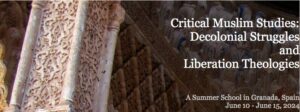
Critical Muslim Studies is inspired by a need for opening up a space for intellectually rigorous and socially committed explorations between decolonial thinking and studies of Muslims, Islam and the Islamicate. Critical Muslim Studies does not take Islam as only a spiritual tradition, or a civilization, but also as a possibility of a decolonial epistemic perspective that suggests contributions and responses to the problems facing humankind today. It offers an opportunity to interpret and understand Muslim phenomena in ways that does not reproduce Eurocentrism, Islamophobia or takfiri exclusivism.
Given that the Covid-19 crisis is under control, we will be returning to in-person instruction. This program includes intensive courses led by various speakers including UC Berkeley’s Professor Ramón Grosfoguel and IHRC’s Arzu Merali. The program also includes guided tours to the Alhambra, the Cordoba Mosque, and surrounding areas related to Al-Andalus. To apply, click here.
THROWBACK: GMD 2017
On January 2017, IHRC hosted their annual Genocide Memorial Day (GMD) event which focuses on remembering man’s inhumanity to man. 2017’s theme was “Lessons from the Cultural Genocide of Muslims and Jews in Europe” GMD has developed into a global phenomenon with events taking place in Amsterdam, Paris, Al-Quds, Lisbon and Madrid. Informed by our Islamic faith and ideology GMD seeks to deconstruct the hierarchies of oppression that attempt to justify the genocides and attempted genocides against oppressed peoples. Click the video below to see the recording of the full event.
Dr. Rebecca Masterton, British Islamic scholar, academic and author, discusses the history of the expulsion of Jews and Muslims from Spain. Sheikh Mohammad Azmi bin Abdul Hamid, Islamic Human Rights Consultative Council Member in the Malaysian Foreign Ministry discusses the genocide of Rohingya Muslims in Myanmar. Professor Ramon Grosfoguel, Department of Ethnic Studies at UC Berkeley, talks about the history of cultural genocide and how it is rooted in the bias of the education system and structural knowledge history of Europe.
Below are books that are currently available at IHRC Bookshop:
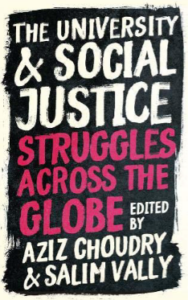 The University & Social Justice Struggles Across the Globe
The University & Social Justice Struggles Across the Globe
Higher education has long been contested terrain. From student movements to staff unions, the fight for accessible, critical and quality public education has turned university campuses globally into sites of struggle. Whether calling for the decommodification or the decolonisation of education, many of these struggles have attempted to draw on (and in turn, resonate with) longer histories of popular resistance, broader social movements and radical visions of a fairer world.
In this critical collection, Aziz Choudry, Salim Vally and a host of international contributors bring grounded, analytical accounts of diverse struggles relating to higher education into conversation with each other. Featuring contributions written by students and staff members on the frontline of struggles from 12 different countries, including Canada, Chile, France, India, Mexico, Nigeria, Occupied Palestine, the Philippines, South Africa, Turkey, the UK and the USA, the book asks what can be learned from these movements’ strategies, demands and visions.
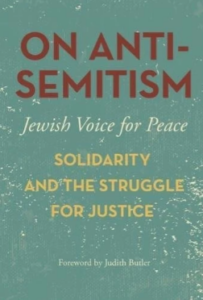 On Anti-Semitism: Solidarity and the Struggle for Justice – Jewish Voice for Peace
On Anti-Semitism: Solidarity and the Struggle for Justice – Jewish Voice for Peace
When the State of Israel claims to represent all Jewish people, defenders of Israeli policy redefine antisemitism to include criticism of Israel. Antisemitism is harmful and real in our society. What must also be addressed is how the deployment of false charges of antisemitism or redefining antisemitism can suppress the global progressive fight for justice.
There is no one definitive voice on antisemitism and its impact. Jewish Voice for Peace has curated a collection of essays that provides a diversity of perspectives and standpoints.
Islam and the Covenants Fulfilled – Syed Muhammad Naquib al-Attas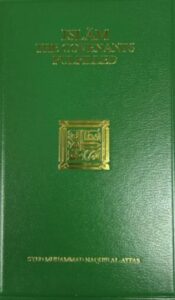
The title of this book refers to the fulfillment of the two Covenants: the Covenant of the Children of Adam and their descendants with God acknowledging His Lordship over them; and the Covenant of the Prophets, i.e. of Nūh, of Ibrahim, of Musa, and of Isā with God. They were asked to acknowledge the coming of a Messenger after them who would confirm whatever was with them of the Scripture and the wisdom that God gave them, and to believe in him and give him their support. They acknowledged it.
Then the Messenger who would come after them, i.e. the Prophet Muhammad, would come in time and take his turn to confirm for himself whatever was with the Prophets by incorporating them with what was with him, i.e. the Quran, into the universal religion of Islam that he brought. Thus the Prophet Muhammad fulfilled both primordial Covenants.
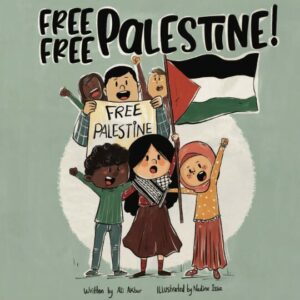 Free Free Palestine! – Ali Akbar
Free Free Palestine! – Ali Akbar
Zara is on a day trip to the Houses of Parliament in London. On the way she learns all about protest, and standing up for freedom and justice.
Join Zara in learning about protest and Palestine. Author: Ali Akbar, Illustrator: Nadine Issa
All profits from this book go to the IHRC Trust Palestine Appeal. Find out more here.
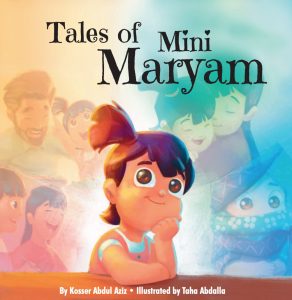 Tales of Mini Maryam – Kosser Abdul Aziz
Tales of Mini Maryam – Kosser Abdul Aziz
Welcome to the delightful world of 3 year old Maryam captured and delivered with 6 heart-warming short stories. Maryam whizzes around her house collecting and loading almost everything on to her tiny push chair, only to be met with disaster but, is all at loss? No, for Maryam remembers the power of dua (prayer).
What do we say after we have sneezed? Why do people go on pilgrimage? Can mini Maryam pray with her family? What do we say before we eat? Curious mini Maryam soon finds out.
Join Maryam as she discovers when and why to read certain Islamic prayers and to also keep her family in check!
This is a short but valuable text that elucidates one of the more controversial issues related to the people of Tasawwuf, and more specifically to the people of unveiling. Although many of the Imams and people of lofty status, whom no one could accuse of lying, have reported seeing the Prophet, peace be upon him, in a wakeful state, the issue remains problematic for some Scholars, among both the supporters and the critics of the Sufis.
Imam al-Suyuti argues that such a vision is not only possible, but that there are many well-documented examples of such visions, both in the time of the Sahabah (radhi Allahu ‘anhum ajma’in) and afterwards. The Imam begins with texts that are irrefutable, from the Sunnah of the Prophet, peace be upon him, which establish the explicit possibility of the occurrence of such visions. Al-Suyuti then presents sound anecdotal evidence that such encounters have occurred in the past, mentioning stories from the Companions (radhi Allahu ‘anhum ajma’in) and from the righteous Scholars and Imams (may Allah have mercy on them). Finally, Imam al-Suyuti concludes this short treatise by providing answers to various possible and plausible objections. Overall, this book is recommended as an introduction to the subject, which is covered in detail in the works of many of the Awliya’ (may Allah have mercy on them).

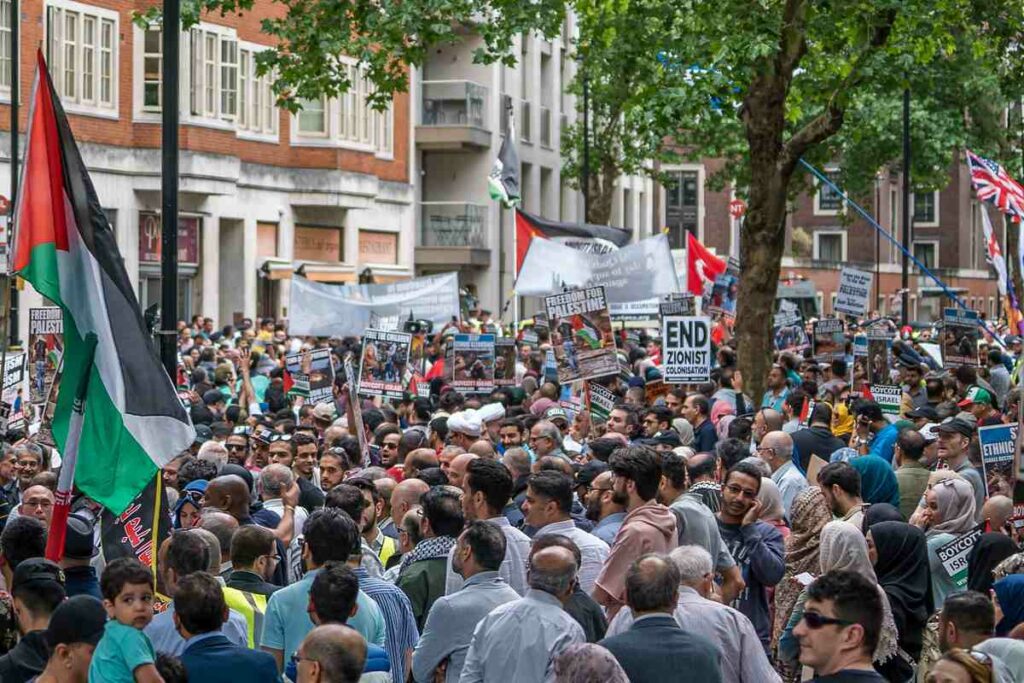
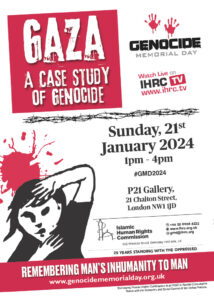 Genocide Memorial Day 2024
Genocide Memorial Day 2024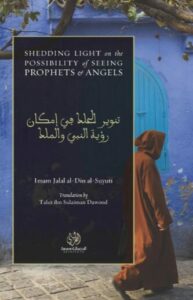 Shedding Light on the Possibility of Seeing Prophets and Angels: Tanwīr al-Ḥalak fī Imkān Ru’yah al-Nabī wa al-Malak – Jalal al-Din al-Suyuti
Shedding Light on the Possibility of Seeing Prophets and Angels: Tanwīr al-Ḥalak fī Imkān Ru’yah al-Nabī wa al-Malak – Jalal al-Din al-Suyuti 




